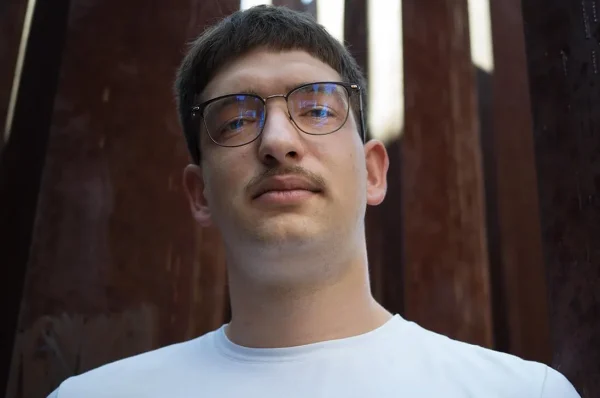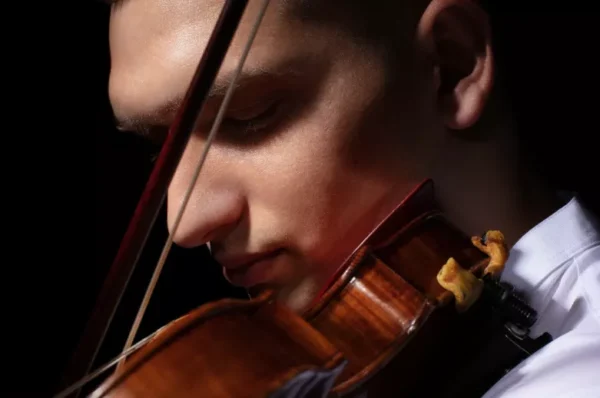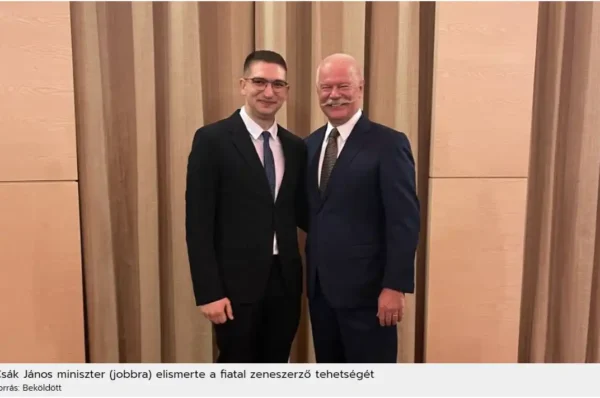As soon as he graduated with honors, he is already teaching at the Academy of Music. He composed the first mass in the history of music in Lovári, the text of which was personally approved by Pope Francis, and he reached the finals of this year’s World Bartók Competition. Composer Patrik Oláh’s rich collection of awards was recently expanded with the Junior Prima Award sponsored by MVM Zrt. We also talked with the versatile young artist about collecting gypsy music, composing methods and acoustic formulas.
Congratulations on the Junior Prima Award, this is a huge recognition for a young composer! When and how did you decide to become a composer?
In the year when I was in the fourth year at the Béla Bartók Conservatory studying violin, I submitted a piece to a national composition competition, then still in the non-composer category, and to my greatest surprise I came second among the composers.
That’s when it became obvious to me that I should deal with composing music. The following year, I was admitted to the Academy of Music, I was still preparing for the violin major, but shortly before admission I decided that I would rather go into composition.
Authentic gypsy music plays an important role in your art. What exactly does this mean and how do you incorporate it into your pieces?
I don’t choose, I want to include everything related to gypsy music. I’m interested in the csárdás-lament type of music that was thought of as gypsy music before the 20th century, and I’d also like to deal with gypsy music in coffee houses. Among other things, I have already written a mass in Lovári and a violin-piano piece in which the violinist appears as the prima, and the piano as the accompanying gypsy band.
But on top of all that, I would also like to organize a collection trip similar to Bartók’s method. Visiting Roma families and villages where the tradition of families playing music together in their free time is still alive..
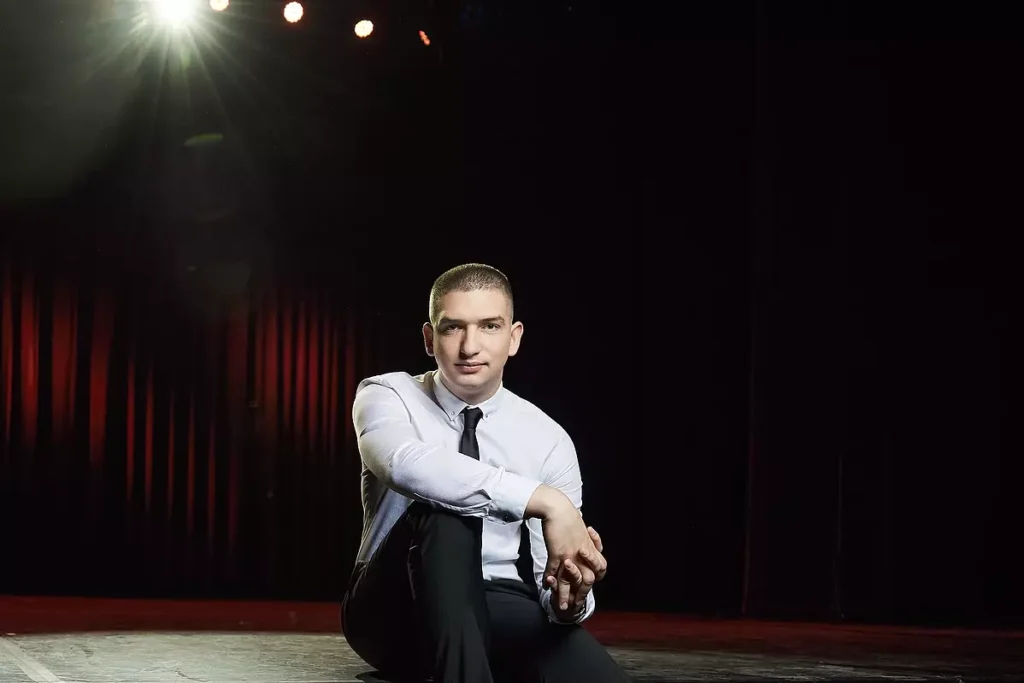
Patrik Oláh (Photo/Source: MVM Zrt.)
And is the tradition still alive? The penultimate minutes of collecting Hungarian peasant music are ticking away.
Yes, unfortunately, the later we start, the less musical material we can collect, but I think he hasn’t completely sacrificed himself to this culture yet.
Did you use multiple numbers, did more than one person plan to research?
I would like to gather people around me who are interested in this. But for now I’m still alone.
The Mass in the Lovár language is the first of its kind. Does the work also work within a liturgical framework?
It was specifically intended to function both as a concert mass and as a liturgical mass.
Within the framework of the International Eucharistic Congress, after the presentation, it was also spoken in a liturgical setting, and I think it stood its ground there as well.
It generated an extremely positive response, at least from what I heard. I think the presentation itself was really intimate, and despite the fact that it is difficult to hear the delicate musical solutions in the special acoustics of the St. István Basilica, it was very popular. It was also well received by critics.
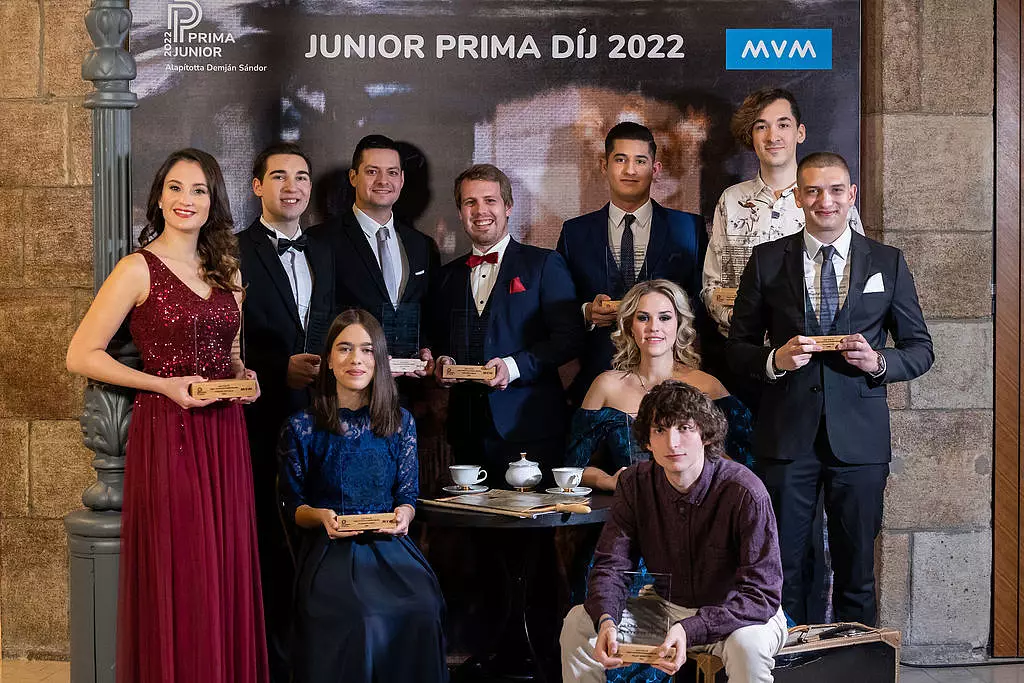
The 2022 recipients of the Junior Prima Award (Photo/Source: MVM Zrt.)
Do you primarily compose on request or out of love?
Upon request. What I start just because I feel like it, I never finish. I find it extremely difficult to compose without seeing the presentation in front of me. In the past, when I was still a violinist, I mostly composed like this, but since I have been a composer, luckily there has always been some request or opportunity that I had to write for and that gave me a purpose.
If you don’t have inspiration, where do you look?
Since I am still at the beginning of my career, the effective working method for me has not crystallized. When asked how I write a play, I often answer that I don’t know, because even I am familiar with this process. I think that in the first decades of a composer’s career, he constantly experiences how he will write a piece.
Recently, the idea that I don’t see myself as an author, but as a channel, has helped me a lot.
I imagine the composition process in such a way that a kind of higher energy has to be channeled through myself and recorded. I need to contact the above and they will help.
Do you have a favorite genre or device that you find particularly inspiring?
I like to write for the violin; since I was a violinist, I feel at home in the world of stringed instruments. So, for example, the string quartet is also close to me. But actually, I’m happy to write for any band. I also enjoyed writing my orchestral piece Taigetos in my graduate year.
I haven’t really composed vocal music apart from the Mass, but I just finished an opera scene.
As part of a music academy project, eight composers were given a scene from Zsigmond Czakó’s drama Leona, for which they had to write music. I got the last, eighth scene.

Patrik Oláh (Photo/Source: MVM Zrt.)
Maybe that’s the hardest.
Yes. It was difficult for me to settle into it, because I was afraid that it would become a little detached from the first seven scenes, and it is not easy to finish an opera without knowing what is ahead, since the preludes were also written at the same time that I was composing my own scene… But then it was surprisingly easy. The piece has already been completed, and will be presented on January 15th at the opera exam of the Academy of Music in the Solti Hall.
You have been teaching at the Academy of Music since September. What and in what form?
In the composition major, I teach transposition and score playing as a demonstrator, as well as composition to students who have not studied before – musicologists, faculty leaders… This semester we are dealing with Palestrina’s counterpoint, then we continue with Bach’s chorales.
How close is teaching to you?
I really like it, although the Palestrina material is quite difficult. It’s all math, logic and combinatorics… I try to pass on everything I know. Fortunately, the students are enthusiastic, as I noticed – they even do homework!
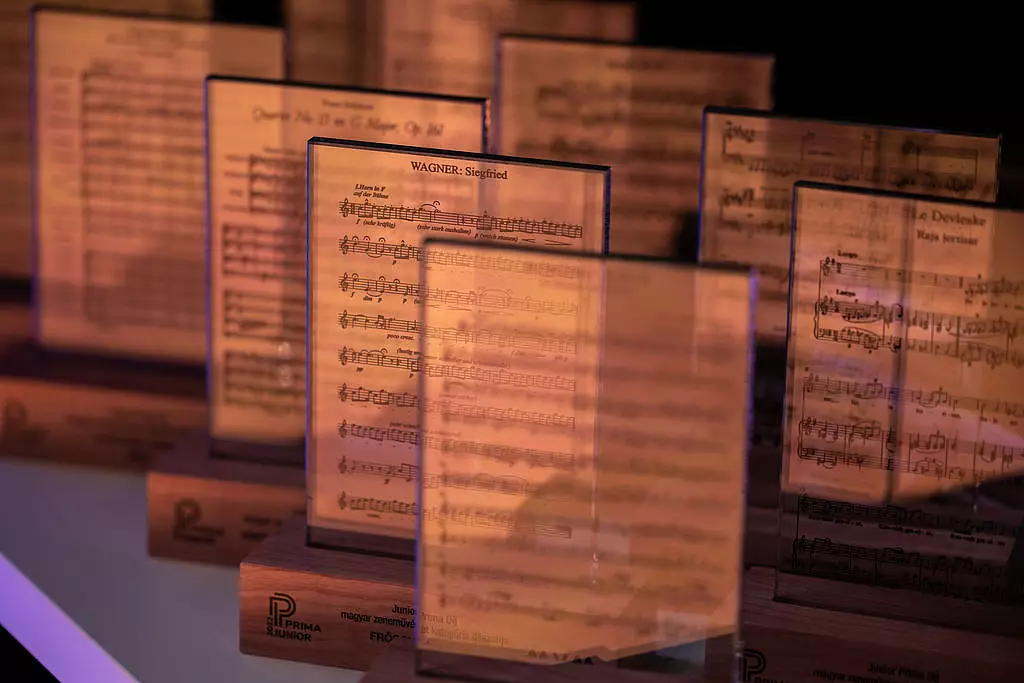
The Junior Prima Award (Photo/Source: MVM Zrt.)
What do you like to do when you’re not making music?
With rest, with friends, I have also been interested in architecture for a long time. If I ever stopped composing, I would definitely start studying architecture.
We turned back to math.
Yes! I always liked math anyway, I wanted to be a math teacher when I was in first grade.
Does this have anything to do with the seriality that is evident in your works?
Of course! Seriality can often be seen in action in my pieces.
For example, I wrote my orchestra piece for my diploma using many formulas. These determine the musical processes, but also the chord structure itself.
I spiced this up with acoustic equations and correlations, which I researched a lot. There’s a lot of work involved. But I like to play with numbers in music as well.
For the MVM Group, the support of young talents and the nurturing and strengthening of cultural values are of paramount importance. On November 22, for the fifteenth time, the most outstanding young talents of Hungarian music received the accolades of the Hungarian music category of the Junior Prima Award.
More information: mvmjuniorprima.hu
Supported content.
Header image: Patrik Oláh (source: MVM Zrt.)
The original article is available at: https://fidelio.hu/klasszikus/kapcsolatot-teremteni-a-fentiekkel-beszelgetes-olah-patrikkal-175870.html
The article can be downloaded: „Kapcsolatot teremteni a fentiekkel” – Beszélgetés Oláh Patrikkal – Fidelio.hu


